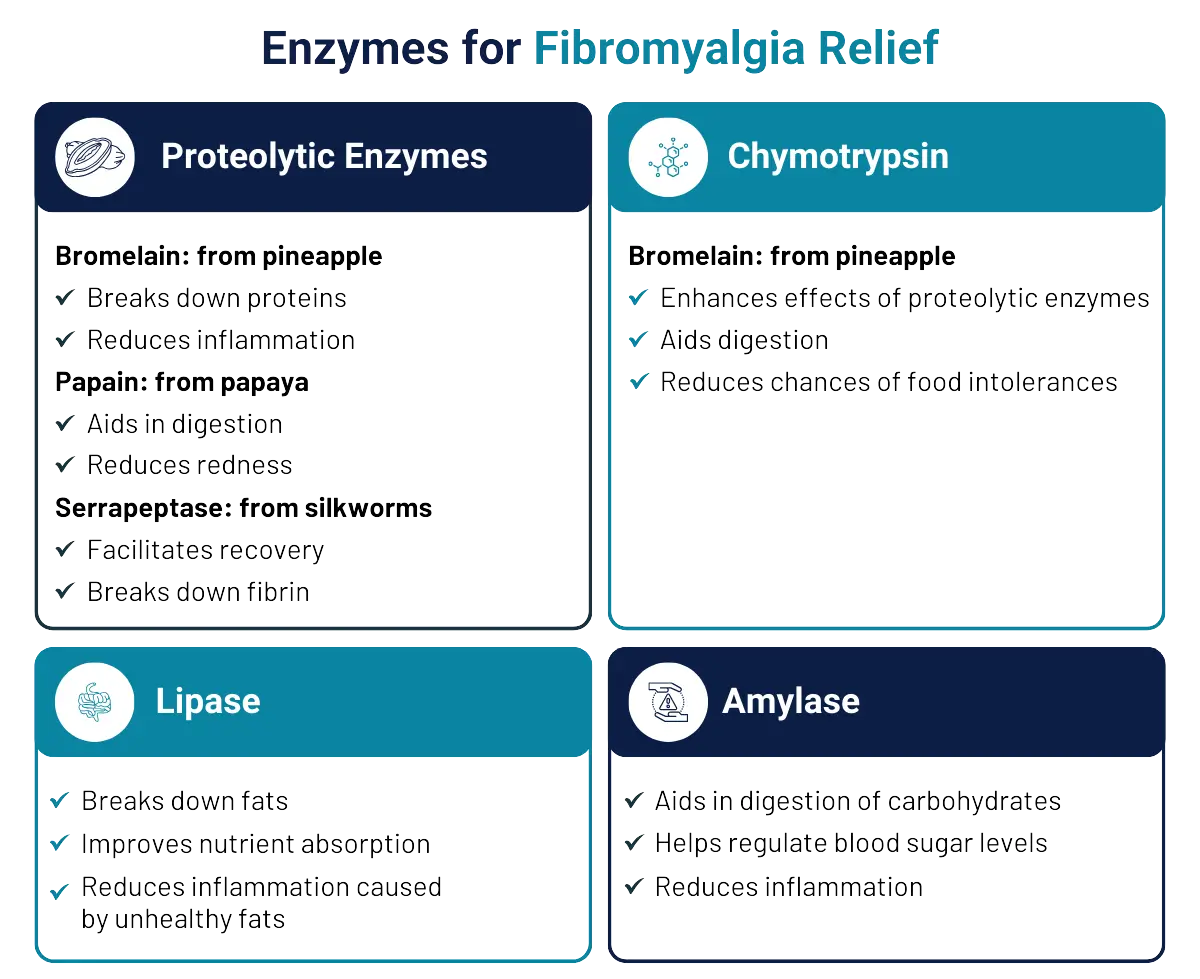
Fibromyalgia is a perpetual illness that leads to extensive musculoskeletal pain, exhaustion, sleep disruptions, and memory loss. It affects millions worldwide, and its exact cause is still unknown. However, recent research has shown that enzymes may play a crucial role in treating fibromyalgia and alleviating its symptoms.
This blog post will discuss enzymes and how they help treat fibromyalgia. It will also discuss the role of diet and supplements in controlling symptoms associated with fibromyalgia.
Fibromyalgia and Inflammation
Fibromyalgia often causes inflammation in the body, which can cause pain, tiredness, and other symptoms. The main reasons for this swelling are stress, inadequate nutrition, or other medical conditions.
White blood cells serve a crucial role in the inflammatory reaction. When the body senses danger, white blood cells release cytokines to help fight it off. However, in fibromyalgia patients, this inflammatory response can become chronic, leading to persistent pain and other symptoms.
Another critical factor in fibromyalgia-related inflammation is fibrin. Fibrin is a protein that helps blood clots form, but excessive fibrin can lead to fibrosis or scar tissue formation. This fibrosis can contribute to the stiffness and pain associated with fibromyalgia.
Enzymes and Fibromyalgia
Enzymes are amino acids that accelerate chemical processes within the body. They are essential for several biological activities, including gastrointestinal motility and immunological function. Enzymes can help with fibromyalgia by reducing pain and swelling.
One primary way enzyme therapy for fibromyalgia can help fight fibromyalgia is by reducing inflammation. Certain enzymes, such as proteolytic enzymes, can break down fibrin and other proteins contributing to inflammation (1). It can help relieve the tenderness and discomfort caused by fibromyalgia.
Enzymes can also help fight pain directly. Certain enzymes, such as bromelain, can naturally relieve pain and reduce discomfort in fibromyalgia.
Additionally, enzymes can help boost the immune system and fight off viruses that may contribute to fibromyalgia symptoms. In a healthy body, enzymes can help the body deal with inflammation better and fight off things that could worsen headaches from fibromyalgia.
Types of Enzymes for Fibromyalgia
Several enzymes can be helpful to those who have fibromyalgia. Here are a few of the most peculiar ones.
1. Proteolytic Enzymes
These enzymes, such as bromelain (taken from pineapple), papain (papaya enzymes), and serrapeptase (gathered from silkworms), are powerful at breaking down proteins like fibrin. They decrease redness and facilitate recovery.
2. Chymotrypsin
This enzyme is often combined with other proteolytic enzymes to enhance their effects. It helps break down proteins and aid digestion, reducing the chances of food intolerances that could worsen fibromyalgia symptoms.
3. Lipase
Lipase enzymes help break down fats, improving nutrient absorption and reducing inflammation caused by unhealthy fats.
4. Amylase
Amylase the digestive system enzyme aids in the digestion of carbohydrates, which can help regulate blood sugar levels and reduce inflammation.
It is recommended to use enzyme supplements for fibromyalgia on an empty stomach to achieve the most significant benefits. Enzymes may not work well with food because stomach acid can make them less effective.

Diet and Fibromyalgia
Diet plays a crucial role in managing fibromyalgia symptoms. Many fibromyalgia patients have food intolerances or sensitivities that can contribute to inflammation and exacerbate their symptoms. People with fibromyalgia may benefit from knowing and avoiding trigger foods to reduce pain, exhaustion, and other symptoms.
Consuming anti-inflammatory foods, such as veggies, fruit, and omega-3 fatty acids, can help reduce inflammation (2). These foods provide anti-inflammatory benefits. Incorporate them into your daily meals to help reduce inflammation, which can, in turn, alleviate fibromyalgia symptoms.
Improving digestive health is also crucial for fibromyalgia patients. A healthy gut bacteria can help decrease swelling and enhance nutrient absorption, improving overall health.
Supplements for Fibromyalgia
- Turmeric: Turmeric includes curcumin, a substance with potent anti-inflammatory effects (3). It can help reduce the inflammation and discomfort related to fibromyalgia.
- Vitamin D: Many fibromyalgia patients are deficient in vitamin D, which can contribute to muscle pain and fatigue. Taking vitamin D may help with these symptoms.
- Coenzyme Q10 (CoQ10): CoQ10 is an antioxidant that helps reduce swelling and boost energy levels in patients with fibromyalgia.
- Vitamin B12: B12 insufficiency is common among people living with fibromyalgia and can contribute to tiredness and problems with thinking. Adding B12 to your diet can assist with these signs.

The Final Words
Fibromyalgia is a complicated ailment that demands a varied approach to treatment. A lot of people with fibromyalgia are exploring alternative treatments like enzymes, dietary adjustments, and supplements to help ease their symptoms.
Enzymes have shown promise in lowering inflammatory processes, combating pain, and strengthening the immune system. They can help people with fibromyalgia.
Enzymes can be a powerful tool in fighting fibromyalgia when used in conjunction with a healthy diet and the right supplements.
It’s important to remember that each person with fibromyalgia is different, so what helps one person may not help another. Working with a healthcare provider to create an individualized treatment strategy that meets your requirements and symptoms is critical.
Fibromyalgia patients can improve their quality of life by taking a holistic approach that includes enzymes, diet, and supplements. It allows them to manage their condition actively.
REFERENCES:
- Fibromyalgia: Pathogenesis, Mechanisms, Diagnosis and Treatment Options Update. (2024, March 30). Fibromyalgia Journal, 10(1), 1-20. https://www.ncbi.nlm.nih.gov/pmc/articles/PMC8068842/
- Anti-Inflammatory Diet. (2024, March 29). Retrieved from https://www.hopkinsmedicine.org/health/wellness-and-prevention/anti-inflammatory-diet
- Anti-Inflammatory Effects of Curcumin in the Inflammatory Diseases: Status, Limitations and Countermeasures. (2024). Anti-Inflammatory & Anti-Allergy Agents in Medicinal Chemistry, 23(1), 1-13. Retrieved from https://www.ncbi.nlm.nih.gov/pmc/articles/PMC8572027/

Meet Dr. Craig Eymann, a dedicated chiropractor and yoga enthusiast with over two decades of expertise in spinal health, sports chiropractic, and personalized care, prioritizing misalignment correction for swift injury resolution.





Leave A Comment